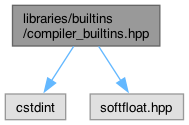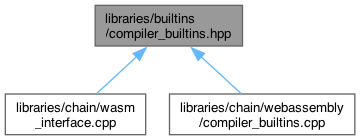Loading...
Searching...
No Matches
compiler_builtins.hpp File Reference
#include <cstdint>#include <softfloat.hpp>
Include dependency graph for compiler_builtins.hpp:

This graph shows which files directly or indirectly include this file:

Go to the source code of this file.
Functions | |
| __int128 | ___fixdfti (uint64_t) |
| __int128 | ___fixsfti (uint32_t) |
| __int128 | ___fixtfti (float128_t) |
| unsigned __int128 | ___fixunsdfti (uint64_t) |
| unsigned __int128 | ___fixunssfti (uint32_t) |
| unsigned __int128 | ___fixunstfti (float128_t) |
| double | ___floattidf (__int128) |
| double | ___floatuntidf (unsigned __int128) |
Function Documentation
◆ ___fixdfti()
| __int128 ___fixdfti | ( | uint64_t | a | ) |
Definition at line 16 of file fixdfti.c.
16 {
19 // Break a into sign, exponent, significand
25
26 // If exponent is negative, the result is zero.
27 if (exponent < 0)
28 return 0;
29
30 // If the value is too large for the integer type, saturate.
32 return sign == 1 ? fixint_max : fixint_min;
33
34 // If 0 <= exponent < significandBits, right shift to get the result.
35 // Otherwise, shift left.
38 else
40
41}
Here is the caller graph for this function:

◆ ___fixsfti()
| __int128 ___fixsfti | ( | uint32_t | a | ) |
Definition at line 16 of file fixsfti.c.
16 {
19 // Break a into sign, exponent, significand
25
26 // If exponent is negative, the result is zero.
27 if (exponent < 0)
28 return 0;
29
30 // If the value is too large for the integer type, saturate.
32 return sign == 1 ? fixint_max : fixint_min;
33
34 // If 0 <= exponent < significandBits, right shift to get the result.
35 // Otherwise, shift left.
38 else
40}
Here is the caller graph for this function:

◆ ___fixtfti()
| __int128 ___fixtfti | ( | float128_t | a | ) |
Definition at line 13 of file fixtfti.c.
13 {
14 const __int128 fixint_max = (__int128)((~(unsigned __int128)0) / 2);
15 const __int128 fixint_min = -fixint_max - 1;
16 // Break a into sign, exponent, significand
22
23 // If exponent is negative, the result is zero.
24 if (exponent < 0)
25 return 0;
26
27 // If the value is too large for the integer type, saturate.
28 if ((unsigned)exponent >= sizeof(__int128) * CHAR_BIT)
29 return sign == 1 ? fixint_max : fixint_min;
30
31 // If 0 <= exponent < significandBits, right shift to get the result.
32 // Otherwise, shift left.
35 else
37}
Here is the caller graph for this function:

◆ ___fixunsdfti()
| unsigned __int128 ___fixunsdfti | ( | uint64_t | a | ) |
Definition at line 15 of file fixunsdfti.c.
15 {
16 // Break a into sign, exponent, significand
22
23 // If either the value or the exponent is negative, the result is zero.
24 if (sign == -1 || exponent < 0)
25 return 0;
26
27 // If the value is too large for the integer type, saturate.
30
31 // If 0 <= exponent < significandBits, right shift to get the result.
32 // Otherwise, shift left.
35 else
37}
Here is the caller graph for this function:

◆ ___fixunssfti()
| unsigned __int128 ___fixunssfti | ( | uint32_t | a | ) |
Definition at line 19 of file fixunssfti.c.
19 {
20 // Break a into sign, exponent, significand
26
27 // If either the value or the exponent is negative, the result is zero.
28 if (sign == -1 || exponent < 0)
29 return 0;
30
31 // If the value is too large for the integer type, saturate.
34
35 // If 0 <= exponent < significandBits, right shift to get the result.
36 // Otherwise, shift left.
39 else
41}
Here is the caller graph for this function:

◆ ___fixunstfti()
| unsigned __int128 ___fixunstfti | ( | float128_t | a | ) |
Definition at line 18 of file fixunstfti.c.
18 {
19 // Break a into sign, exponent, significand
25
26 // If either the value or the exponent is negative, the result is zero.
27 if (sign == -1 || exponent < 0)
28 return 0;
29
30 // If the value is too large for the integer type, saturate.
33
34 // If 0 <= exponent < significandBits, right shift to get the result.
35 // Otherwise, shift left.
38 else
40}
Here is the caller graph for this function:

◆ ___floattidf()
| double ___floattidf | ( | __int128 | a | ) |
Definition at line 26 of file floattidf.c.
27{
29 return 0.0;
34 int e = sd - 1; /* exponent */
35 if (sd > DBL_MANT_DIG)
36 {
37 /* start: 0000000000000000000001xxxxxxxxxxxxxxxxxxxxxxPQxxxxxxxxxxxxxxxxxx
38 * finish: 000000000000000000000000000000000000001xxxxxxxxxxxxxxxxxxxxxxPQR
39 * 12345678901234567890123456
40 * 1 = msb 1 bit
41 * P = bit DBL_MANT_DIG-1 bits to the right of 1
42 * Q = bit DBL_MANT_DIG bits to the right of 1
43 * R = "or" of all bits to the right of Q
44 */
45 switch (sd)
46 {
47 case DBL_MANT_DIG + 1:
48 a <<= 1;
49 break;
50 case DBL_MANT_DIG + 2:
51 break;
52 default:
55 };
56 /* finish: */
60 /* a is now rounded to DBL_MANT_DIG or DBL_MANT_DIG+1 bits */
62 {
63 a >>= 1;
64 ++e;
65 }
66 /* a is now rounded to DBL_MANT_DIG bits */
67 }
68 else
69 {
70 a <<= (DBL_MANT_DIG - sd);
71 /* a is now rounded to DBL_MANT_DIG bits */
72 }
73 double_bits fb;
75 ((e + 1023) << 20) | /* exponent */
79}
Definition int_t.h:37
struct udwords::@2 s
Here is the call graph for this function:

Here is the caller graph for this function:

◆ ___floatuntidf()
| double ___floatuntidf | ( | unsigned | __int128 | ) |
Here is the caller graph for this function:
